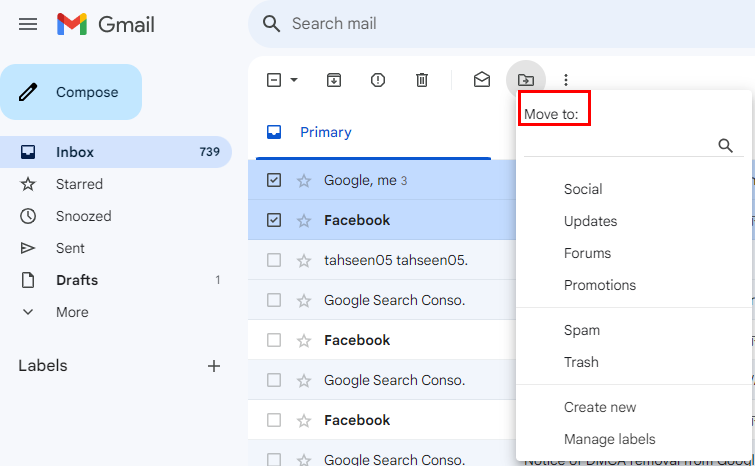Simplify your Gmail experience by learning how to move email to folders in Gmail. This guide will show you step-by-step how to automatically move emails to folders in Gmail, keeping your inbox clean and organized.

Folders are like physical containers in your inbox. When you move an email to a folder, it's physically removed from your inbox and placed in that specific folder. This is ideal for organizing emails into broad categories like "Work," "Updates," "Forums", or "Social."
Using folders effectively can significantly improve your email organization. Consider creating folders for common categories like work, personal, social, or specific projects. You can also use nested folders for more granular organization, such as creating subfolders within your "Work" folder for different projects.

1. Improve work efficiency: By classifying emails, you can find emails that need to be replied or processed more quickly, reduce browsing and searching time, and improve work efficiency. Different types of emails can be classified according to importance, urgency, subject, etc. to better prioritize work.
2. Keep it clear and tidy: Sorting your emails into categories keeps your inbox clear and tidy, avoiding clutter. An organized inbox can help us better browse and manage emails and reduce confusion and omissions.
3. Facilitates archiving and retrieval: Categorized mail can be archived and retrieved more easily. By grouping messages into different topics, projects or contacts By classifying, you can find the emails you need more quickly and facilitate subsequent review and reference.
1. Click the "Create a new label" button: This is usually found in the left-hand sidebar of your Gmail inbox.
2. Enter a name for your folder: Choose a descriptive name that reflects the content of the emails you'll be placing in it. For example, "Work Projects," "Personal Finances," or "Social Events."
3. Click "Create".
1. Select the emails: Check the boxes next to the emails you want to move.
2. Move to a folder: Click the "Move to" button and choose the desired folder.

Filters are powerful tools for automating email organization. You can create filters based on various criteria, such as sender, recipient, subject, keywords, or even attachments. For example, you could create a filter to automatically move emails from your boss to a "Work" folder, or to move emails containing the word "urgent" to a "Priority" folder.
Step 1. Create a filter: Go to Settings > Filters and Blocked Addresses.
Step 2. Set criteria: Specify the conditions you want the filter to match (e.g., sender, recipient, subject, keywords, or attachments). For example, you could create a filter to automatically move emails from your boss to a "Work" folder.
Step 3. Choose an action: Select "Apply the label" and choose the label you want to apply to matching emails.
Step 4. Save the filter: Click "Create filter."
Develop a clear and organized labeling system by categorizing emails into main labels like "Work" and "Personal," and use sub-labels for more detail. Consistently apply these labels to keep your email sorted effectively.
Set up filters to automatically apply labels based on criteria such as sender or subject. This saves time and keeps your inbox organized by directing emails to the right labels automatically.
Establish a routine to review and clean your inbox. Delete irrelevant emails and archive those you want to keep but don’t need immediately, keeping your inbox focused and uncluttered.
If the storage of Gmail is almost full or about to exceed the limit, you can consider upgrading your current plan, or transferring some emails to another location and then make room for new emails. If you prefer the latter choice, MultCloud is an excellent choice. No matter you decide to move emails to local or cloud drive, it can best satisfy you. The multiple cloud manager can convert Gmail and Outlook emails (along the attachement) into PDF formats and then transfer to local hard drive or popular cloud drives like Google Drive, OneDrive, SharePoint, Dropbox, etc.
Besides, it also specializes in migrating, or syncing data from one cloud to another. Different from the traditional manual download and reupload method, the cloud to cloud migration or syncing process does not pass through the local device, and does not rely on the Internet connection, but the traffic data.
Reduce email clutter by unsubscribing from newsletters and promotional emails you no longer want. Use Gmail’s unsubscribe option or third-party tools to streamline this process.
Utilize Gmail’s search operators like "from:", "to:", "subject:", and "label:" to find specific emails quickly. Combine operators for precise searches and save frequent searches for convenience.
By understanding and effectively utilizing these techniques, you can streamline your Gmail workflow and stay organized.